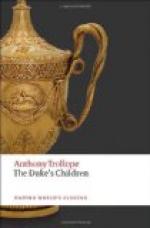‘Lady Mabel Grex!’
‘Do you not like her?’
‘Oh yes;—but what made you think of her, papa?’
‘Perhaps Silverbridge would come to us then.’
Lady Mary thought that she knew a great deal more about that than her father did. ‘Is he fond of Lady Mabel, papa?’
’Well,—I don’t know. There are secrets which should not be told. I think they are very good friends. I would not have her asked unless it would please you.’
‘I like her very much, papa.’
’And perhaps we might get the Boncassens to come to us. I did say a word to him about it.’ Now, as Mary felt, difficulty was heaping itself upon difficulty. ’I have seldom met a man in whose company I could take more pleasure than in that Mr Boncassen; and the young lady seems to be worthy of her father.’ Mary was silent, feeling the complication of the difficulties. ’Do you not like her?’ asked the Duke.
‘Very much indeed,’ said Mary.
’Then let us fix a day and ask them. If you will come to me after dinner with an almanac we will arrange it. Of course you will invite Miss Cassewary too?’
The complication seemed to be very bad indeed. In the first place was it not clear that she, Lady Mary, ought not to be a party to asking Miss Boncassen to meet her brother at Matching? Would it not be imperative on her part to tell her father the whole story? And yet how could she do that? It had been told to her in confidence, and she remembered what her own feelings had been when Mrs Finn had suggested the propriety of telling the story which had been told to her! And how would it be possible to ask Lady Mabel to come to Matching to meet Miss Boncassen in the presence of Silverbridge! If the party could be made up without Silverbridge things might run smoothly.
As she was thinking of this in her own room, thinking also how happy she could be if one other name could be added to the list of guests, the Duke had gone alone into his library. There a pile of letters reached him, among which he found one marked ‘Private’, and addressed in a hand which he did not recognise. This he opened suddenly,—with a conviction that it would contain a thorn,—and, turning over the page found the signature to be ‘Francis Tregear’. The man’s name was wormwood to him. He at once felt that he would wish to have his dinner, his fragment brought to him in that solitary room, and that he might remain secluded for the rest of the evening. But still he must read the letter,—and he read it.
’My dear lord duke,




